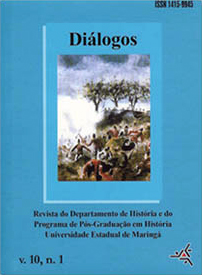ALGO MÁS QUE HEROÍNAS. VARIAS ROLES Y MEMORIAS FEMENINAS DE LA GUERRA DE LA TRIPLE ALIANZA
Abstract
Resumen. La guerra de la Triple Alianza o del Paraguay fue una de las contiendas más largas y sangrientas de América Latina, fundamentalmente para Paraguay que perdió alrededor de la mitad de su población y gran parte del territorio tras su derrota. Sin embargo, en el Paraguay del siglo XX, la guerra fue conmemorada como “la epopeya nacional” en la que todo el pueblo (tanto hombres como mujeres) se destacó por su patriotismo y valor. Sin embargo, más que los hombres caídos, fueron las mujeres que supuestamente tomaron las armas al final de la guerra para defender la patria, las que adquirieron la categoría de heroínas nacionales. Recién en los últimos años, surgieron otras memorias y perspectivas de la guerra y del rol de las mujeres paraguayas. Si bien es cierto que éstas desempeñaron papeles muy importantes durante el conflicto armado, sobre todo en su fase tardía, también fueron víctimas de la creciente tiranía del presidente Francisco Solano López. Durante mucho tiempo, la memoria oficial sólo recordó a las “residentas” que acompañaron al ejército hasta el final y que pelearon contra los aliados cuando ya no quedaban soldados para protegerlas. Por su parte, la oposición liberal (tanto contemporánea como posterior) resaltó los sufrimientos de las mujeres “destinadas”, o sea, de las prisioneras reunidas en campos de concentración en las zonas fronterizas. El objetivo de esta oposición liberal no era presentar otra perspectiva sobre los roles femeninos sino más bien reforzar la crítica al régimen de López y a otros regímenes autoritarios de Paraguay. En este artículo, serán analizadas las diferentes actividades femeninas durante la guerra (ya sean voluntarias o forzadas) como algunas fuentes que nos puedan dar una perspectiva diferente, para después explicar por qué los paraguayos privilegiaron la memoria de las “residentas” por sobre la de las “destinadas” e, incluso, sobre la de los veteranos. Abstract. The War of the Triple Alliance or the Paraguayan War has been one of the longest and bloodiest wars in Latin America, especially for Paraguay, which lost almost half of its population and much of its territory after its defeat. Nevertheless, in the 20th century the war was commemorated in Paraguay as “la epopeya nacional”, during which the whole nation, men and women, showed considerable courage and patriotism. Women who took up arms at the end of the war to defend themselves against the enemy soldiers were praised for fighting for the fatherland and were raised to the status of national heroines. Only recently, other voices and other memories of the role of women have been discussed. If women played a crucial role during the war, especially in the final stage of the fighting, they were also victims of the increasing tyranny of President Francisco Solano López. The official Paraguayan historiography has for a long time commemorated the “residentas” who accompanied the troops on their withdrawal into the remote areas of the country and who fought against the allies in order to protect themselves when there were no more soldiers left. On the other hand, contemporary and later opposition highlighted the sufferings of the “destinadas”, women prisoners gathered in remote concentration camps. Criticism has been levelled not to give another perspective on the role of women but to reinforce their critique of President López and other authoritarian governments in Paraguay. Current research analyses the role and the position of women during the war as well as their memories, in order to explain why Paraguayans have for a century privileged the memory of only one group, the residentas over other equally important groups like the destinadas or even the male veterans.Downloads
DECLARAÇÃO DE ORIGINALIDADE E CESSÃO DE DIREITOS AUTORAIS
Declaro que o presente artigo é original, não tendo sido submetido à publicação em qualquer outro periódico nacional ou internacional, quer seja em parte ou em sua totalidade. Declaro, ainda, que uma vez publicado na revista DIÁLOGOS, editada pela Universidade Estadual de Maringá, o mesmo jamais será submetido por mim ou por qualquer um dos demais co-autores a qualquer outro periódico. Através deste instrumento, em meu nome e em nome dos demais co-autores, porventura existentes, cedo os direitos autorais do referido artigo à Universidade Estadual de Maringá e declaro estar ciente de que a não observância deste compromisso submeterá o infrator a sanções e penas previstas na Lei de Proteção de Direitos Autorias (N. 9609, de 19/02/98).
STATEMENT OF ORIGINALITY AND COPYRIGHT CESSION
I declare that the present article is original, has not been submitted for publishing on any other national or international journal, neither partly nor fully. I further declare that, once published on DIÁLOGOS journal, edited by the State University of Maringá, it will never be submitted by me or by any of the other co-authors to another journal. By means of this instrument, on my behalf and on behalf of the other co-authors, if any, I waive the copyright of said article to the State University of Maringá and declare that I am aware that non-compliance with this commitment will subject the violator to sanctions and penalties set forth in the Copyright Protection Law (No 9609, of 19/02/98).

















